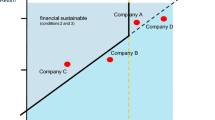Abstract
This paper addresses the issue of knowledge accounting in business contexts. Despite the efforts of researchers and practitioners, the approaches that have been proposed are different, have several limitations, and their soundness and usefulness have been questioned. Moving from a critical review of the state-of-the art of the methods of knowledge accounting already proposed in the knowledge management literature, the paper illustrates an approach to account for knowledge based on a recognition and measurement of knowledge objects flowing from the stocks of different economic players. This approach can allow a measurement of knowledge generated, possessed, and exchanged by companies, based on charts and indicators similar to those employed in traditional accounting. This can improve the interpretation and comparability of economic measures of knowledge in different business cases and over time.





Similar content being viewed by others
References
Anderson JR (2007) How Can the Human Mind Occur in the Physical Universe? Oxford University Press, New York.
Anthony RN (1988) The Management Control Function. Harvard Business School Press, Boston.
Beer S (1981) Brain of the Firm: The Managerial Cybernetics of Organization. Wiley, New York.
Bolisani E and Oltramari A (2009a) Formalising knowledge as a measurable economic asset: an interdisciplinary approach. In Proceedings of the 10th European Conference on Knowledge Management (Bolisani E and Scarso E, Eds), pp 109–115, Academic Conferences Limited, Reading, UK.
Bolisani E and Oltramari A (2009b) Capitalizing flows of knowledge: models and accounting perspectives. In Proceedings of the 4th International Forum on Knowledge Asset Dynamics – IFKAD. (Schiuma G, Weir M, Spender JC and Lerro A, Eds), pp 51–52, Center for Value Management – University of Basilicata, Matera, Italy.
Bose R (2004) Knowledge management metrics. Industrial Management and Data Systems 104 (6), 457–468.
Boudreau J (2003) Strategic knowledge measurement and management. In Managing Knowledge for Sustained Competitive Advantage (Jackson S, Hitt MA and Denisi A, Eds), pp 360–397, John Wiley & Sons, New York.
Boyd J, Ragsdell G and Oppenheim C (2007) Knowledge transfer mechanisms: a case study from manufacturing. In Proceedings of the 8th European Conference on Knowledge Management (Remenyi D, Ed), pp 139–146, Academic Conferences Limited, Reading.
Bragg SM (2011) GAAP 2012. Interpretation and Application of Generally Accepted Accounting Principles. John Wiley & Sons, Hoboken, NJ.
Demski JL, Fellingham JC, Ijiri Y and Sunder S (2002) Some thoughts on the intellectual foundations of accounting. Accounting Horizons 16 (2), 157–168.
Finkelstein L (2003) Widely, strongly and weakly defined measurement. Measurement 34 (1), 39–48.
Foray D (2004) The Economics of Knowledge. MIT Press, Boston.
Gowthorpe C (2009) Wider still and wider? A critical discussion of intellectual capital recognition, measurement and control in a boundary theoretical context. Critical Perspectives on Accounting 20 (7), 823–834.
Grossman M (2006) An overview of knowledge management assessment approaches. Journal of American Academy of Business 8 (2), 242–247.
Holsapple CW and Singh M (2001) The knowledge chain model: activities for competitiveness. Expert Systems with Applications 20 (1), 77–98.
Hubbard D (2007) How to Measure Anything. Wiley, Hoboken, NJ.
Iandoli L and Zollo G (2007) Organizational Cognition and Learning. IGI, Hershey, PA.
Kankanhalli A and Tan BCY (2004) A review of metrics for knowledge management systems and knowledge management initiatives. In Proceedings of the 37th Hawaii International Conference on System Science (Sprague H, Ed) IEEE Computer Society Press, Los Alamitos.
Kuah CT and Wong KY (2011) Knowledge management performance measurement: a review. African Journal of Business Management 5 (15), 6021–6027.
Lambe P (2004) Accounting for knowledge management. [WWW document] http://greenchameleon.com/thoughtpieces/account.pdf (accessed 30 October 2011).
Lev B (2001) Intangibles. Management, Measurement, and Reporting. Brookings Institution Press, Washington.
Liebowitz J and Suen CY (2000) Developing knowledge management metrics for measuring intellectual capital. Journal of Intellectual Capital 1 (1), 54–67.
Llewellyn S (1994) Managing the boundary: How accounting is implicated in maintaining the organization. Accounting, Auditing and Accountability Journal 7 (4), 4–23.
Mackenzie B, Coestee D and Njjkizana T (2012) Interpretation and Application of International Financial Reporting Standards. John Wiley & Sons, New York.
Malhotra J (2003) Measuring knowledge assets of a nation: knowledge systems for development. Invited Keynote Presentation, United Nations Advisory Meeting of the Department of Economic and Social Affairs, New York, 4–5 September.
Nash HH (2000) Accounting for the future. a disciplined approach to value-added accounting. [WWW document] http://home.sprintmail.com/~humphreynash/Draft_Proposal.htm (accessed 24 March 2012).
Polanyi M (1967) The Tacit Dimension. Doubleday Anchor, Garden City, NY.
Ricceri F (2008) Intellectual Capital and Knowledge Management. Strategic Management of Knowledge Resources. Routledge, Milton Park.
Scarso E and Bolisani E (2012) Trust in knowledge exchanges between service providers and clients: a multiple case study of KIBS. Knowledge Management Research & Practice 10 (1), 16–26.
Scott WR (2006) Financial Accounting Theory. Pearson, Toronto.
Skinner DJ (2008) Accounting for intangibles - a critical review of policy recommendations. Accounting and Business Research 38 (3), 191–204.
Stone DN and Warsono S (2003) Does accounting account for knowledge? In Handbook of Knowledge Management, Vol. 1 (Holsapple CW, Ed), pp 253–269, Springer, Berlin.
Sveiby KE (2010) Methods for measuring intangible assets. [WWW document] http://www.sveiby.com/articles/IntangibleMethods.htm (accessed 3 April 2012).
Acknowledgements
The authors gratefully thank two anonymous referees and Enrico Scarso for their stimulating comments on an earlier version of this paper.
Author information
Authors and Affiliations
Corresponding author
Rights and permissions
About this article
Cite this article
Bolisani, E., Oltramari, A. Knowledge as a measurable object in business contexts: a stock-and-flow approach. Knowl Manage Res Pract 10, 275–286 (2012). https://doi.org/10.1057/kmrp.2012.13
Received:
Revised:
Accepted:
Published:
Issue Date:
DOI: https://doi.org/10.1057/kmrp.2012.13




